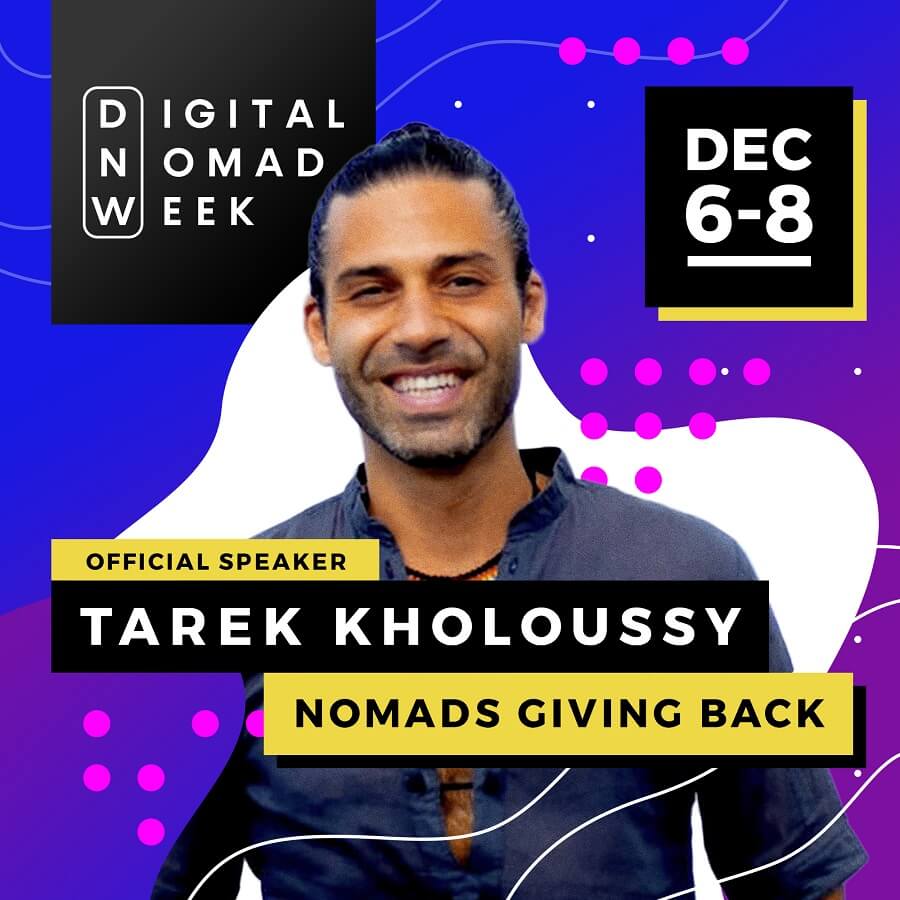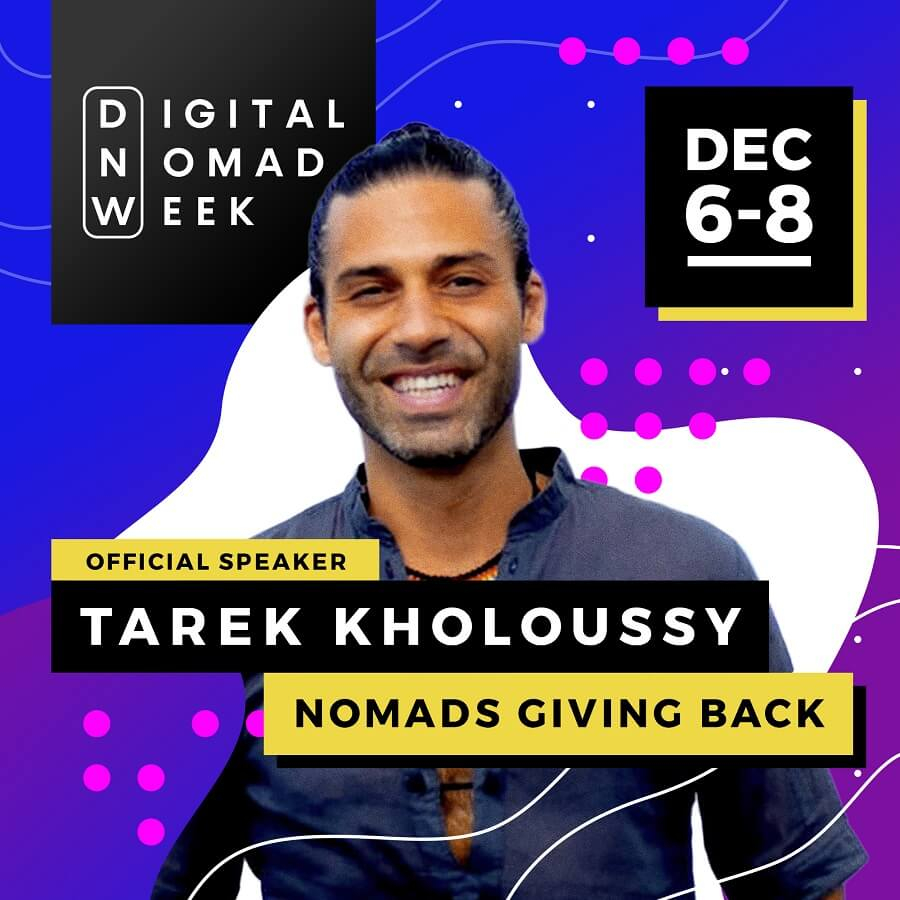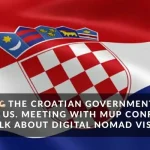Tarek is a social entrepreneur with a BSBA from Georgetown and an MBA with honors from New York University. He’s founder of social enterprise called Nomads Giving Back! with the vision to inform, inspire and empower you to give back to the communities you call ‘home away from home.’ Its goal is to help solve the problem “I’d like to give back, but I don’t know how” and serve as a bridge between foreigners and local communities through social causes. Tarek and our global tribe welcome anyone who believes in our vision of inspiring social impact to get involved and join the movement!
(Colombia Language Skillshare, 2020)
1. You are a keynote speaker at Digital Nomad Week in December. Tell us a little about DNW, why you decided to get involved, and what you will be talking about.
Olúmidé, the founder of Digital Nomad Week, is a good friend of mine. We met more than a couple of years ago; and from the moment we met, we realized that we share similar values and visions for the nomad movement. We both value community, skill sharing and making a positive difference in the local communities we live in.
I’ll be speaking on the topic of Digital Inclusivity and excited to share what my team and I are doing at Nomads Giving Back & Nomads Skillshare to help upskill local communities through professional training programs and fostering greater inclusivity through scholarship opportunities for those with less fortunate financial situations. We strive to empower global citizens and local communities to learn the skills they desire to live the lives they imagined.

2. How does DNW rate on the nomad conference/festival calendar in your opinion in terms of size/importance?
DNW is among the most popular and well known nomad conferences around. This is a wonderful opportunity to share about our impact mission and inspire the nomad movement to share their skills and give back to local communities. Our team and I are excited to see many of the leading voices in the movement are coming together for this special conference!
3. You have a great project called Nomads Giving Back/ Nomad Skillshare. Tell us a little about that, including a couple of concrete examples of success.
At Nomads Giving Back, we’re a community of socially-conscious global citizens who inspire you to give back to the communities you call home away from home. We do this through various advocacy, fundraising and volunteering programs.
At Nomads Skillshare, we’re a community of nomads, remote workers and global citizens who empower you to learn the skills to live the life you imagined!
Our growing team of more than 100 global citizens has already led more than 120 events, panel discussions, masterminds, impact trips, language skillshares, masterclasses, workshops and courses with thousands of attendees. And we’re actively growing our online communities of thousands more at www.nomadsgivingback.com and www.nomadsskillshare.com where socially-conscious global citizens around the world can connect and learn!
Recently, we launched our courses where students learn professional skills to gain online jobs while offering scholarships for less fortunate people to benefit as well. We’re proud that our recent one-month course, sponsored through our scholarship fund, on “How to Get Your Dream Online Job” empowered our Indonesian students with the skills and knowledge to get better jobs! And this month, we’re launching two new courses on “How to Become a Social Media Manager” and “How to Become a Virtual Assistant.”
(Bali Impact Adventure, 2019)
4. The pandemic put an increased focus on the potential of remote work, but the trend has been building for some time. Where do you think all this will be in 5 years?
I’ve had the opportunity to work remotely for more than a dozen years of my twenty-year career – both as a corporate leader as well as a social entrepreneurial nomad. Since beginning my nomad journey nearly a decade ago, I’ve believed that the nomad movement was going to grow fast. And now, we all know that the pandemic has accelerated the adoption of remote work resulting in rapid exponential growth.
The two macro forces that were holding back this movement from growing faster have been governments and big businesses. Nowadays, we’re witnessing a sea change from the perspective of both. Now, Governments are welcoming more foreigners to work remotely and even competing for talent. In just the past year or two, more than 25 countries have introduced new types of visas for remote workers. And now, big businesses are welcoming more openly the new dynamic of working outside the office. Some large employers are now saying: “There’s no office to come back to!” So with these two macro forces now endorsing remote work more than ever before, I wouldn’t be surprised if the number of remote workers living abroad will grow 50-fold over the next five to ten years!
(Bali Impact Adventure, Language Skillshare – 2021)
5. Tell us about your DN experience in Croatia. What was good, and what does Croatia need to focus on to improve?
I visited Croatia a couple of times in 2009 to Hvar and 2017 to Zagreb and Dubrovnik, and really enjoyed both trips. I’ve had the opportunity to explore over 100 countries, and I can honestly say that Croatia is one of the most beautiful countries I’ve seen!
Nomads tend to gravitate to geographic locations that offer a higher quality of life for a lower cost of living. And Croatia definitely meets these major criteria, with so much to offer. Nomads also love places where there are opportunities to work easily, outlets such as coworking hubs working friendly cafes, as well as an attractive calendar and events where it’s easy to meet people.
I’m optimistic that Croatia will continue to grow in numbers and popularity as a nomad destination. I look forward to visiting Croatia again, hopefully soon to experience more of this country’s special culture and amazing people!
(Dubrovnik, 2017)
6. You are installed as the Croatian Minister of Tourism. What are the next steps you would implement to develop Croatia’s DN strategy?
If I became the Croatian Minister of Tourism, I would make similar recommendations to what I made to the government officials of Argentina who also are aiming to attract digital nomads.
Recently, I was invited to speak at a large conference called “Nomads BA” in Buenos Aires, Argentina. This is the first ever specialized digital nomad conference sponsored by the local government. And even though I’m not able to join, I’m very excited to see this new trend taking birth of governments endorsing the nomad movement and welcoming foreigners to live and work remotely in their countries.
For Croatia, I would encourage the adoption of a simple visa process welcoming digital nomads. From what I understand, a new type of visa has been introduced recently but it seems it has some limiting aspects compared to what some other nations are offering. The more flexible the terms and simple the process, the more nomads will be attracted to come and live longer stretches of time in Croatia.
(Župa Dubrovačka, Croatia – 2017)
Other ways that the government could factor into their strategy would be to sponsor a similar large conference as Argentina. I would also recommend building collaborations with the pioneers in the movement who already lead nomad communities or whose network and influence are strong.
The easier it is for a foreigner to gain residency and establish businesses legally, the more likely they will stay for years or make it a regular home base. This could also help Croatia by leading to more local jobs and greater tax revenue.
Well-coordinated programs and perks would be appealing, which could be supported through local co-working hubs and co-living accommodations.
Of course, a well-designed Public Relations outreach effort would be helpful. Connecting with influential news outlets, nomad bloggers and community leaders for mutually-beneficial cross-promotion opportunities.
And what is most important to me, aligned with our mission at Nomads Giving Back and Nomads Skillshare, is to advocate for ways that nomads can connect more with Croatians as well as share their skills and give back to local Croatian communities. The stronger the nomad’s local relationships, the deeper the nomad’s roots. And everyone benefits – the nomads and the Croatians.
To learn more about Nomads Giving Back, visit the official website. You can connect with Tarek Kholoussy via LinkedIn.
To get your ticket for Digital Nomad Week, check out the event website.
For more news and features about digital nomads in Croatia, follow the dedicated TCN section.











